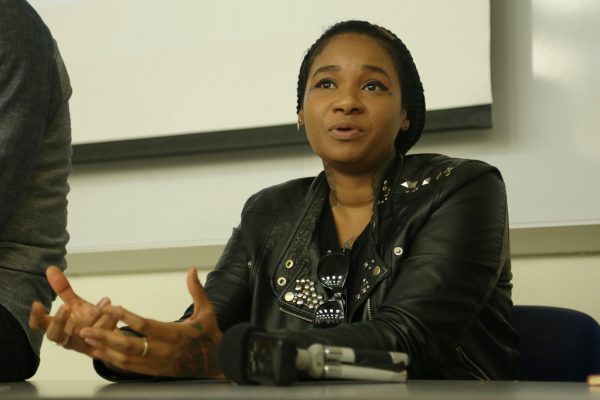Students might expect a hip-hop class to focus on top 40s, but SF State’s hip-hop course went underground with a special lecture on hip-hop that included satire, interdisciplinary art, education and its cultural evolution.
The panel, invited by lecturer and DJ Davey D and Assistant Professor Dawn-Elissa Fischer, featured the interdisciplinary artist Jean Grae, hip-hop author and educator, Adam Mansbach and DJ Kuttin Candi Wednesday, April 23.
Each member of the panel had a different story and perspective to share on hip-hop.
Grae, the prolific New York City-based actress, author, comedian and emcee, has released five albums, three episodes of her comedy show “Life with Jeannie,” and a book since last October.
“I don’t consider myself any of those one entities,” said Grae. “I don’t want to pick just one thing, that’s boring.”
“She’s a renaissance woman,” said Davey D. “She’s a musician, actress, comedian – what can I say, an all around good woman.”
 Hip-hop artist Jean Grae Workshop class answers questions in room HSS 135 at SF State Wednesday, April 23. Photo by Jenny Sokolova
Hip-hop artist Jean Grae Workshop class answers questions in room HSS 135 at SF State Wednesday, April 23. Photo by Jenny Sokolova
Grae was reared in an artistic household. She grew up with two parents rooted in the New York City jazz scene and learned about dealing with the American Society of Composers, Authors and Producers and record labels. She knew she wouldn’t be signing any predatory contracts.
“Jean owns all her stuff for all time,” she joked about herself.
Mansbach, author of what he called the first obscene fake children’s book, “Go the Fuck to Sleep,” addressed the evolution of hip-hop from a social movement rooted in emcees, b-boys, DJs and graffiti artists into a two-sided second generation that ranged from hip-hop academics, literature and spoken word poetry to contemporary commercial hip-hop.
“When graffiti artists in New York were waging war on the city’s subways, the bridge and tunnel commuters were scared,” said Mansbach. “There was a political conversation going on that they couldn’t understand.”
Even with that fear, educating with contemporary hip-hop is still manageable.
“You have to meet kids where they are,” he said. “Whatever they’re listening to you can turn them into an active listener. You can look at misogyny, marketing, selling culture.”
Now, there is a hip-hop course in every university with an African studies program, said Davey D.
“You don’t get a semester on Kanye,” said Abdi Muse, a teacher’s assistant of the class. “Its what you least expect. You end up understanding some political and cultural aspects that you’ve never thought about.”
Mansbach’s 2005 debut novel, “Angry White Black Boy,” discusses racial tension and white guilt in the United States. In the novel, a white teenage New Yorker is so overridden with white guilt that he launches a militant campaign against white people and white privilege.
“People don’t understand that its satire,” he said. “Back then satire was a great vehicle for discussion but nowadays the world is so absurd that it satirizes itself.”
Kandi, the first female to make it to the US DMC DJ competition, celebrated the trans-racial aspects of hip-hop, and passed her book “Empire of Funk: Hip-Hop and Representation of Filipino/a America,” around and reminded the class that Jay Z’s first DJ, Neil Armstrong, was Filipino.
Grae will be performing at Oakland’s New Parish theatre on Thursday April 24 with Oakland’s own BPOS and DJ Davey D.






